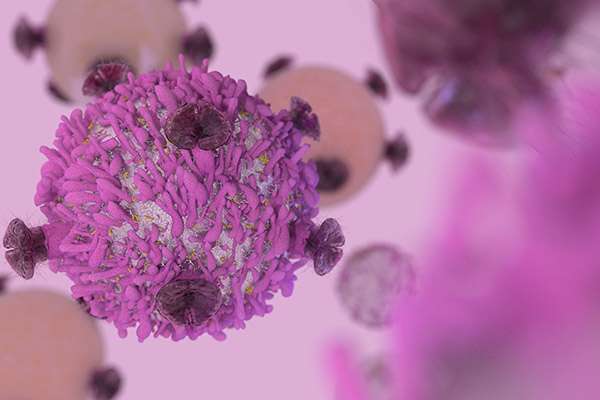On This Page:
- What Is Immunotherapy?
- How Does Immuntotherapy for Pancreatic Cancer Work?
- What Immunotherapy Treatments Exist for Pancreatic Cancer?
- What Are the Side Effects of Immunotherapy for Pancreatic Cancer?
- Questions to Ask the Doctor About Immunotherapy

What Is Immunotherapy?
Immunotherapy is a treatment that helps your immune system attack cancer cells. You get it through an injection, IV or pill that is swallowed.
How Does Immuntotherapy for Pancreatic Cancer Work?
Your immune system helps your body fight germs and sickness. But, it often doesn’t know that cancer cells are dangerous, or it can’t get to them. Immunotherapy helps your body find and fight the cancer cells like it fights other sickness.
What Immunotherapy Treatments Exist for Pancreatic Cancer?
Most immunotherapy drugs for pancreatic cancer are in clinical trials. In clinical trials, they are usually given with other treatments, such as chemotherapy. Genetic testing can tell you about inherited mutations and biomarker testing can tell you about the biology of your tumor to help you find treatment options, including immunotherapy.
Two immunotherapy drugs are available to patients with pancreatic cancer who have certain genetic mutations or biomarkers:
KEYTRUDA® (pembrolizumab)
Approved to treat any type of unresectable or metastatic solid tumor that has been identified as having a biomarker referred to as microsatellite instability-high (MSI-H), mismatch repair deficient (dMMR) and or tumor mutational burden-high (TMB-H). This accounts for 1-3% of patients.
JEMPERLI® (dostarlimab)
Approved for patients with mismatch-deficient (dMMR) recurrent or advanced solid tumors that have progressed on or following previous treatment, and who have no satisfactory alternative treatment options.
Why Should I Consider a Clinical Trial?
In the fight against pancreatic cancer, clinical trials often offer the best treatment options. They give patients early access to cutting-edge treatments, like immunotherapy, which can lead to research progress, improved treatment and better results.
Pancreatic cancer patients who participate in clinical research have better outcomes. Every treatment available today was approved through a clinical trial. The Pancreatic Cancer Action Network strongly recommends clinical trials at diagnosis and during every treatment decision.
What Are the Side Effects of Immunotherapy for Pancreatic Cancer?
Sometimes immunotherapy causes the immune system to attack normal cells and tissue. Possible side effects are:
- Fever
- Headache
- Nausea
- Fatigue
- Muscle and joint aches
- Redness, itching or sores where the needle was inserted
- Pancreatitis: swelling of the pancreas
When immunotherapy is given in clinical trials, patients also often receive another treatment, like chemotherapy. Chemotherapy may have other side effects.
Talk to your doctor about any side effects you have.
Questions to Ask the Doctor About Immunotherapy
- Are there immunotherapy clinical trials available for me?
- What type of immunotherapy is available to me?
- What are the potential benefits and risks of this treatment? How do they compare with the benefits and risks of other treatments?
- Why do researchers believe this treatment may be effective?
- Has this treatment been studied before? What were the results of earlier trials?
- What type of blood tests, scans or other tests will I need during my treatment? How often?
- How long will the treatment last?
- What are the potential side effects of my treatment choices? How likely are they to occur?
- How can I expect to feel during the treatment?
We’re Here to Help
For free, in-depth and personalized resources and information on pancreatic cancer treatment – including immunotherapy and clinical trials – contact PanCAN Patient Services.
Information reviewed by PanCAN’s Scientific and Medical Advisory Board, who are experts in the field from such institutions as University of Pennsylvania, Memorial Sloan-Kettering Cancer Center, Virginia Mason Medical Center and more.
Information provided by the Pancreatic Cancer Action Network, Inc. (“PanCAN”) is not a substitute for medical advice, diagnosis, treatment or other health care services. PanCAN may provide information to you about physicians, products, services, clinical trials or treatments related to pancreatic cancer, but PanCAN does not recommend nor endorse any particular health care resource. In addition, please note any personal information you provide to PanCAN’s staff during telephone and/or email communications may be stored and used to help PanCAN achieve its mission of assisting patients with, and finding cures and treatments for, pancreatic cancer. Stored constituent information may be used to inform PanCAN programs and activities. Information also may be provided in aggregate or limited formats to third parties to guide future pancreatic cancer research and education efforts. PanCAN will not provide personal directly identifying information (such as your name or contact information) to such third parties without your prior written consent unless required or permitted by law to do so. For more information on how we may use your information, you can find our privacy policy on our website at https://www.pancan.org/privacy/.





